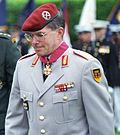This article needs additional citations for verification .(November 2018) |
You can help expand this article with text translated from the corresponding article in German. (February 2021)Click [show] for important translation instructions.
|
| Inspector General of the Bundeswehr | |
|---|---|
| Generalinspekteur der Bundeswehr (German) | |
 Flag of the Inspector General | |
| Federal Ministry of Defence | |
| Abbreviation | IGBW |
| Member of | Ministry of Defence Executive Group |
| Reports to | Federal Minister of Defence |
| Precursor | Oberkommando der Wehrmacht |
| Formation | 1 June 1957 |
| First holder | General Adolf Heusinger |
| Deputy | Deputy Inspector General of the Bundeswehr |
| Website | Official Website |
The Inspector General of the Bundeswehr (German : Generalinspekteur der Bundeswehr, GenInspBw), is the highest-ranking military position held by a commissioned officer on active duty in the Bundeswehr , the present-day armed forces of Germany.
Contents
All Inspectors General have been of the rank of a (four-star) general or admiral, and they head the Führungsstab der Streitkräfte, the German Defence Staff within the Federal Ministry of Defence, and is the direct military advisor to the Federal Minister of Defence who, in peacetime according to the Basic Law for the Federal Republic of Germany, is the default holder of the supreme command authority (German : Inhaber der Befehls- und Kommandogewalt) to ensure civilian control of the military.
The Inspector General is responsible for the overall military defense concept of the Bundeswehr, including the overall planning, preparation, as well as assessment of the whole Bundeswehr operations. [1] Subordinate to the Inspector General are the commanders of the branches of the Bundeswehr, the Inspector of the Army, Inspector of the Air Force, and Inspector of the Navy, and the commanders of the Joint Support Service and Joint Medical Service.

















